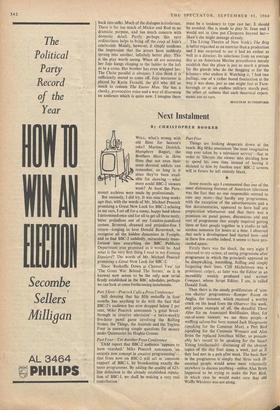Next Instalment
By CHRISTOPHER BOOKER
But seriously, I did try. It was nine long weeks ago that, with the words of Mr. Michael Peacock promising a Great New Look for BBC-2 echoing in my ears, I set off for a sunny, happy land where I determined once and for all to get all those nasty, bitter prejudices out of my London-jaundiced system. Bronzed, cleansed and prejudice-free I return--longing to love Donald Baverstocic, to recognise all the hidden dynamism in Tonight, and to find BBC-2 suddenly, miraculously trans- formed into everything the BBC Publicity Department ever promised us it would be. And what is the very first thing I read in my Evening Standard? The words of Mr. Michael Peacock promising a Great New Look for BBC-2.
Since 'Reshuffle Down at Channel Two' (or 'The Great War Behind The Scenes,' as it is known) now seems to be the only new serial firmly established in the BBC schedules, perhaps we can look at some forthcoming instalments.
Part Three—Peacock Calls a Press Conference Still denying that his fifth reshuffle in four months has anything to do with the fact that BBC-2's audience has now dropped below 2 per cent, Mike Peacock announces 'a great break- through in creative television'—a twice-weekly five-hour panel game involving the Rolling Stones, the Things, the Animals and the Topless Four in answering simple questions for money under Quizmaster Sir Hughie Greene.
Part Four—Yet Another Press Conference TAM report that BBC-2 audience 'appears to have vanished.' Mike Peacock announces 'an entirely new concept in creative programming'— that from now on BBC-2 will act in 'common support' of BBC-1, by broadcasting exactly the same programmes. By adding the quality of 625- line definition to the already established reputa- tion of BBC-1, we shall be making a very real contribution.' Part Five Things are looking desperate down at the ranch. Big Mike announces 'the most imaginative step ever taken by a television service'—that in order to 'liberate the viewer into deciding how to spend his own time instead of having it dictated to him by faceless men' BBC-2 screens will in future be left entirely blank.
Some months ago I commented that One of the most distressing features of American television was the fact that no one responsible seemed to care any more—that hardly any programmes, with the exception of the advertisements and a few documentaries, appeared to have had any preparation whatsoever and that there was a premium on panel games, discussions and any sort of programme that simply required getting three or four people together in a studio to talk aimless nonsense for hours at a time. I observed that such a development had started here—and in these few months indeed, it seems to have pro- ceeded apace.
Firstly there was the shock, the very night I returned to my screen, of seeing programme after programme in which the principals appeared to be sleepwalking, mumbling, fluffing and simply forgetting their lines. Cliff Michelmore was a prominent culprit, as later was the Editor in an incredibly weakly produced and written Compact, whose Script Editor, I see, is called Donald Tosh.
Then there is the steady proliferation of 'aim- less chatter' programmes--Romper Room on Anglia, for instance, which received a worthy crack on the head from the Observer this week, and prime example of all, the dreadful Three After Six on Associated Rediffusion. Here, for out-of-town viewers, we see three people—a waffling saloon-bar bore named Jack Hargreaves (speaking for the Common Man), a Pert Bird (speaking for the Common Woman) and Alan Brien (he replaced Jonathan Miller, so presum- ably he's meant to be speaking for the Smart. Young Intellectuals)—discussing all the obvious topics of the day four times a week, just as if they had met in a pub after work. The basic flaw in the programme is simply that three such ill- assorted people would never meet voluntarily anywhere to discuss anything—unless Alan Brien happened to be trying to make the Pert Bird, in which case he would make sure that old Waffle Whiskers was not along.






























 Previous page
Previous page